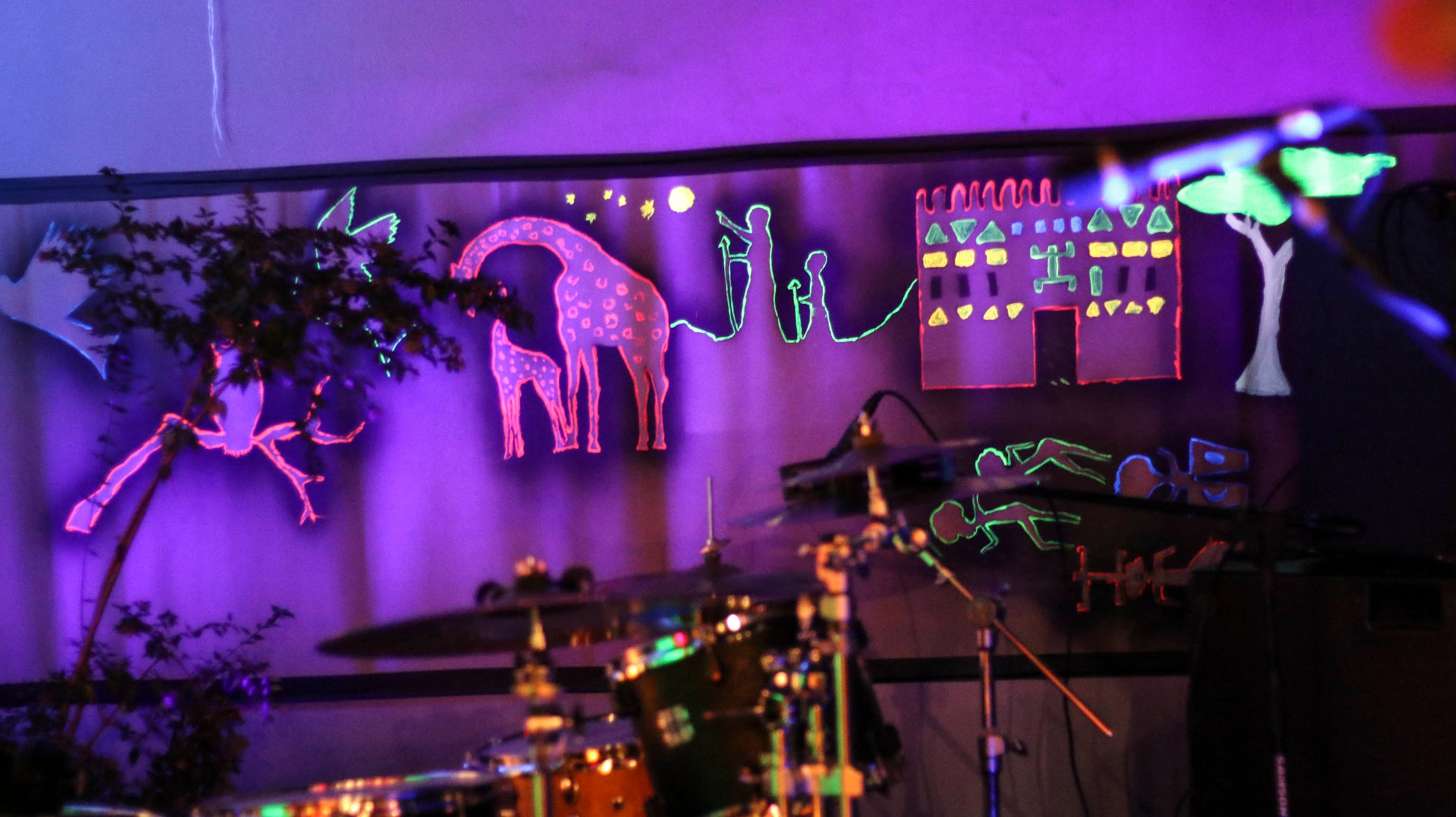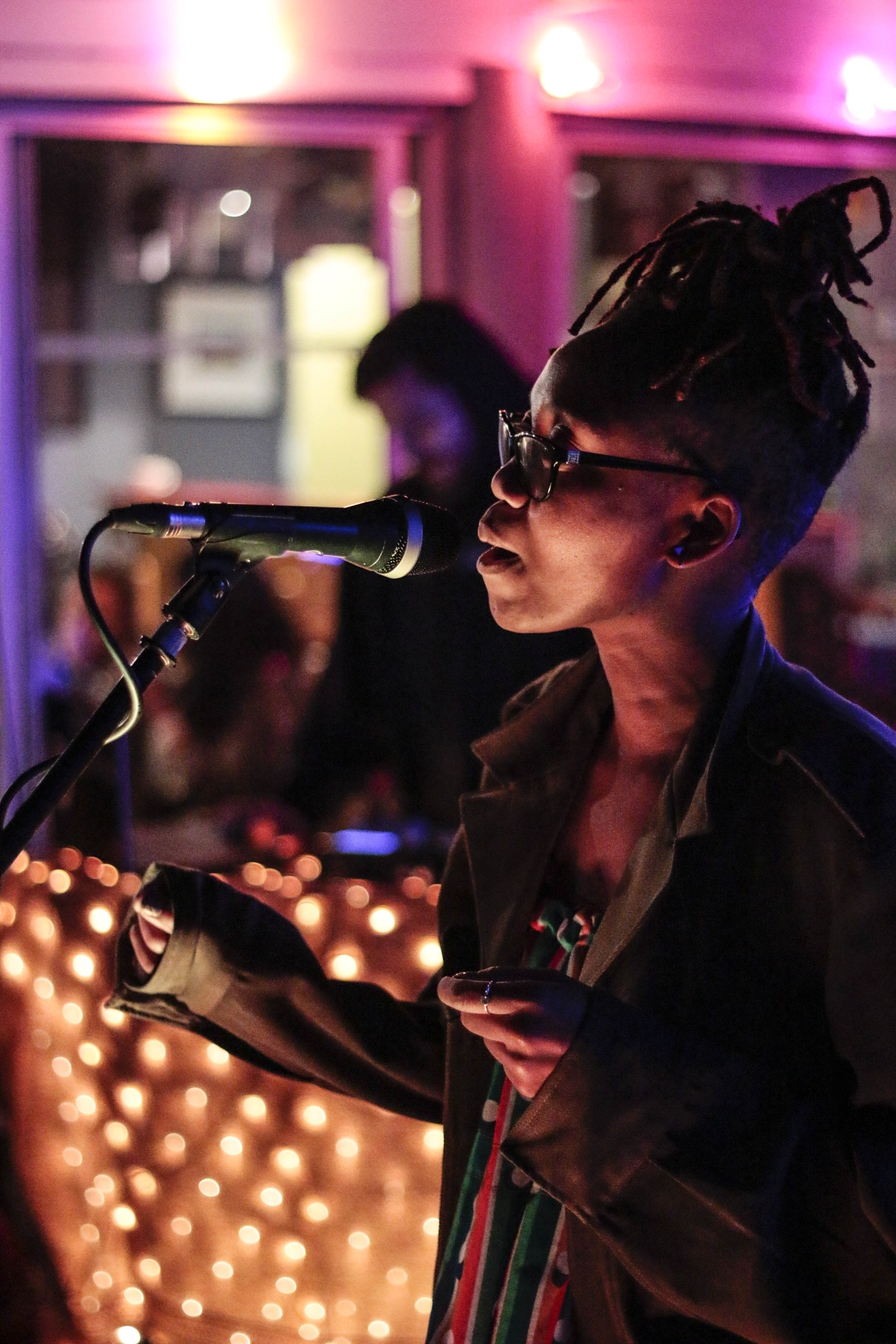Light show: Black Freddy is a collaboration between Mr Freddy
The road to eternal salvation is supposedly filled with pastors, tithes and fasting. It is much like the road from Johannesburg to Maputo, filled with border-town hustlers — some uniformed, some not — all working in cahoots to fleece you out of pocket change in the name of good neighbourliness.
We are the last players of a colonial game officiated by boundaries not of our own making. The car I am driving apparently lacks the correct documentation to pass through the border without being harassed.
With little time to waste before singer Fifi the Raiblaster plays her first gig at Maputo’s Gil-Vicente, I must figure out a way of not being fleeced as I negotiate my way through the Ressano Garcia border. I am on a quest to articulate the artistic commitment of Fifi as she makes friends and artistic trade routes across Southern Africa and the Atlantic.
Fifi, for all the care and deliberation she puts into her art, as evinced by the album Black Matter, is a little-known veteran of the South African music scene. Unimposing in appearance, she cloaks the political punch of her music in a disarming whimsical persona. She is on a three-country tour with cohorts both old and new — her producer Kanif, Mozambican beatmaker Nandele and Swaziland experimental duo Mr Freddy.
In part, the show is sponsored by South African music initiative Concerts SA, which helps artists to travel to Southern African countries for live performances and workshops.
On May 4, Maputo is somewhere between tropical warmth and autumn chill. At 10pm, Gil- Vicente, down the road from the Samora Machel statue that watches over the city, is empty, save for the artists and bar staff. Things in Mozambique get going after midnight, the story goes. It is a folktale passed on through the generations, it seems.
Some time after 11pm, people trickle into the venue as if on cue, which is where its inadequacies come to the fore. It is tiny to the point of absence, a crowd of 20 accounting for a full night of patrons. Besides all that, tonight’s soundman is more interested in his Facebook feed than in Nandele “taking the first bullet”, as tour co-ordinator Mtsembeni Masina puts it.
Nandele takes the bullet as if he is cloaked in body armour, dispensing distorted beat pieces with what looks like a kaossilator connected to his laptop. They are scabrous and war-like, as if channelling the civil war years through a filter of sound manipulation. The sonics of it all cause Nandele to move jaggedly and hunch over his machines, as if transmitting something into their DNA through his body.
Nandele smokes throughout his performance, an act that somehow marries him to his process. I imagine it to be what a night out to Los Angeles beat party Low End Theory might sound like. Nandele’s audience, of about 20 people, is arranged in an arc from the bar to the opposite perimeter wall. It is a wide berth that renders the audience curious onlookers rather than active participants. They are like cars slowing down to gawk at the scene of an accident.
After an hour of this, Fifi and Kanif enter the stage to perform songs from her last album, Black Matter, and to present songs from her collaboration with Mr Freddy. They are performed pretty much as they have been recorded. Dressed in black shorts and boots, Fifi appears diminutive on stage, perhaps dwarfed by one of those fold-out banners, this one screaming Concerts SA, and affixed almost directly behind her.

[The stage design of Black Matter is a collaboration between Mtsembeni Masina and Fifi. It incorporates elements of Khoi, San and Dogon astronomy which she touches on in her music]
Performing and recording for more than a decade, Fifi takes the slow approach to art and ideas, each piece layered on top of the next methodically. On the stage at Gil-Vicente, she seems to cut a straight line through the songs, neither lingering over words nor extending their syllables. The crowd are still shit talkers one side and a human wall at the bar, backs turned away from the counter.
Her collaboration with Mr Freddy, the two-person act primarily consisting of a drummer and a trumpeter, is drowned out as a result of the sound guy who refuses to pay attention. Kanif’s predilection for bass runs unchecked over drummer Mwesigwa Kisaakye’s loose-limbed, unaggressive strokes and Ralph Smit’s sometimes muted, ruminative trumpet. Black Freddy, as Fifi has been dubbing the almost year-old collaboration, is not making sense on stage, with the two musicians being subsumed by the vast expanse of Black Matter’s sound.
When Mr Freddy take to the stage as a band, they seem to have the sound of an idea in transit, still searching for its true north. Kisaakye plays like a drummer aware of but unwilling to unleash his full power. He plays with the instincts of an autodidact, seemingly creating his own time signatures. Together they combine to create experiments that are not showy enough to be labelled virtuosity. They are more a sound honest to its creation. Smit expands the band’s palette by playing a melodic pattern on the mbira and looping it to create another sonic layer to their sound.
But all efforts are pretty much wasted that Friday night. The crowd, a mixture of expats, musicians such Tiago Correia-Paulo and Maputo’s social set, has thinned to a whisper. I disappear into the cold Maputo night, artfully dodging roadblocks manned by beretted men in army fatigues. The tour group travels to Swaziland in the dead of night to prepare the set for a Saturday night performance in Mbabane’s Bahle Gallery.
Swaziland, May 5
The Bahle Gallery is a homely spot. In existence for about 15 years and operating from new premises in the heart of Mbabane, it is what some artists refer to as the lifeblood of Swaziland’s jazz scene.
Driving through Malkerns like an outlaw on the run, I am eventually pointed in the direction of Bahle Gallery by KFC-munching hippies near the gambling town of Gables.
I enter the gallery as Fifi sings the first notes of her set. Bahle Gallery is a two-tiered structure with an open courtyard with an enclosed bar on one level. Fifi’s voice resonates through the air, the entire night coloured by the set design as much as more attentive sound manipulation.

[After a Mozambique show spoiled by the sound engineer, Fifi the Railblaster finds her footing in Swaziland’s Bahle Gallery. (Mbongeni Dlamini)]
She seems unrushed and, emboldened by the attentiveness of the courtyard audience, stretching out syllables, playing with the range of her voice as if it was plasticine, sounding like a modern-day Billie Holiday. The set design is elaborate and some of it unfolds in real time as Masina paints a luminous scene of bow-and-arrow-wielding astronauts mixed with rock art motifs. Using neon colours, illuminated by UV light, the entire scene is transformed into washes of colour. There are clouds made of cotton wool, the setup suggesting an ascent into the heavens — space travel if you will.
The lighting design pulsates to the throbbing beat when she sings Black Matter, with the cotton-wool cloudscape behind her radiating blues and reds thanks to the reach of the UV lights. As Masina paints to the right of the stage, the light travels, illuminating the white screen behind Fifi. With Kanif’s equipment also under a wash of lightbulbs, the entire scene is transformed into a space she can call her own.
The contrast between the vibe of Gil-Vicente and Swaziland could not be greater.
By the time Fifi gets to River of Love, she is in full enunciation mode.
Apple of Love, grown too attached. I want my chi back and not your deceit. Hate what I’ve become knowing love hurts, fell crazily into a palm.
Remember in The Hague you kissed me and said “hush baby don’t worry come kiss, I tell”
Now I’m nursing feeling, sick from love; kissed a king in the rain, no I gave myself to blame.
Skid back She ran ran Mama got a heart attack, rolling down a river, rolling down a river of love.
Her voice travels above all other instruments, as it should. This time, when she combines with Mr Freddy to create Black Freddy, there is a clear intention behind all that is happening.
Kisaakye, he of the intuitive sound signatures, seems to come into his own. Smith’s tones assume a brighter shape and there seems to be a clearer path in front of Black Freddy’s way. The wonders of attentive sound engineering. Fifi’s songs come across as never about one thing, concerned as they are about creation stories, the myths and facts of evolution, astronomy and the relations of man and woman.
In Man Monkey, she muses:
Man monkey, Grimaldi; headed north or east. Are you man are you slave, did you birth the world?
Sweet lonely crops of lonely, pillars of fallen sons. Their story stretches binds, heated chills that crystallize. Ancestral amphibians, turned reptile indigenous, to flesh. Euphrates, Tigress, Yellow river, Nike; they harvest life…”
But it is River of Love that stays with me long after its rhythmic hook and guitars have been muted.
That I have travelled across two borders to get acquainted with a stage act to me signifies the lack of plurality almost inherent in South Africa’s music scene. From the outside in, South Africa seems little more than a homebase for Iapetus (her record label), a place where they can plan their careers with their sights set on the globe at large.
What the success of labelmate Yugen Blakrok proves is that, regardless of the label’s relative lack of attention these days (a snubbing that is oblivious to its illustrious past), a collective can always regroup, especially with the momentum of like-minded individuals.
The Black Freddy songs that Fifi has worked on with members of Mr Freddy represent the expansion of her sonic palette, something that, for those who have checked out her sound since she emerged, was already in progress with Black Matter.
Kissakye, born of Ugandan parents in Swaziland, says the momentum of Mr Freddy has been so brisk that in only a year they have been able to play some of South Africa’s major festivals. “It has been amazing,” he says. “We’re playing Bushfire this year and that’s the fun of it. The highlight of it is that we’re playing with a visual artist from Pretoria, Keneilwe. She is amazing.”
As for Fifi, the Black Matter Collaboration tour has been fruitful, despite the ambivalence of a preoccupied audience in Mozambique. Swaziland, which she is playing for the second time, has been something of a revelation for me. Your art will always find its audience. No matter the numbers, no matter the time it takes. For all the stops and starts Fifi’s career has taken, the sheer quality of Black Matter and the promise of Black Freddy, are statements in and of themselves.
Nandele, Fifi, Kanif, Mr Freddy and Swaziland-based singer Hanwa perform at the Bassline in Jo’burg on Saturday, May 12. Tickets are R100. Doors open at 8pm